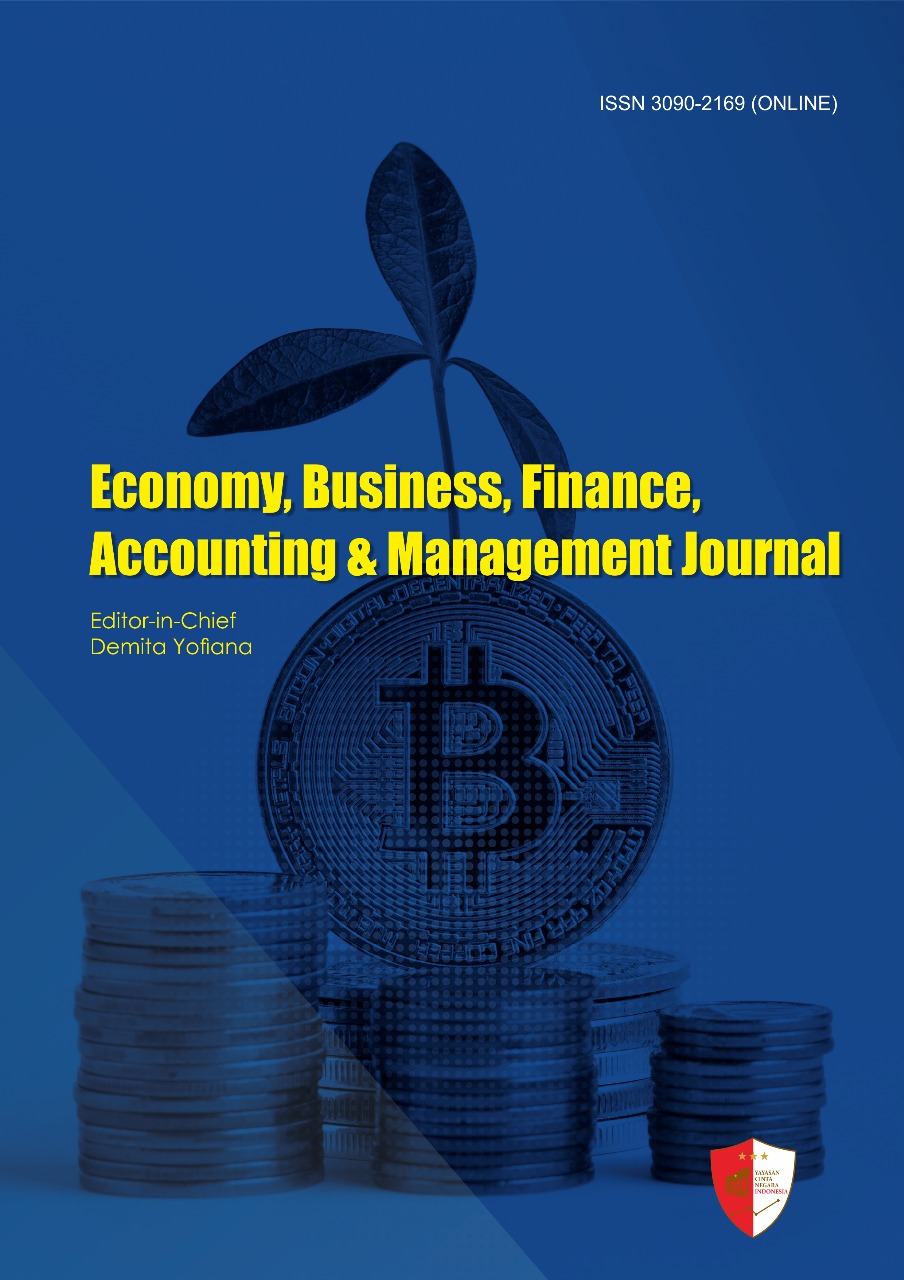The Influence of the Role of the Digital Economy in Advancing Economic Growth in Indonesia
Keywords:
E-Commerce, Economic Growth, Digital Economy, Digital Divide, Financial InclusionAbstract
This study aims to evaluate the impact of the digital economy on financial inclusion in Indonesia and analyze the challenges faced in its implementation. In recent years, the rapid development of digital technology has opened up great opportunities to expand access to financial services in Indonesia, especially for people who were previously unreached by the traditional banking system. However, despite significant progress, there are still various obstacles that hinder the achievement of optimal financial inclusion, such as the digital divide, low financial literacy, and data security issues. This research uses a qualitative and quantitative approach by analyzing data from various sources, including surveys of digital financial service users, government reports, and case studies of digital financial inclusion policy implementation. The results show that the digital economy has great potential to improve financial inclusion, but the main challenges lie in the technology access gap, socio-economic inequality, and the need to strengthen data protection and transaction security regulations. Based on these findings, this study provides policy recommendations involving digital infrastructure upgrades, digital financial literacy education, and strengthened security regulations to support the achievement of greater financial inclusion in Indonesia. It also suggests further studies to understand the long-term impact of the digital economy on reducing social and economic inequality and the effectiveness of existing policies
References
Zhang, J., Zhao, W., Cheng, B., Li, A., Wang, Y., Yang, N., & Tian, Y. (2022). The impact of digital economy on the economic growth and the development strategies in the post-COVID-19 era: evidence from countries along the “Belt and Road”. Frontiers in public health, 10, 856142.
Aminullah, E., Fizzanty, T., Nawawi, N., Suryanto, J., Pranata, N., Maulana, I., ... & Budiatri, A. P. (2024). Interactive components of digital MSMEs ecosystem for inclusive digital economy in Indonesia. Journal of the Knowledge Economy, 15(1), 487-517.
Margiansyah, D. (2020). Revisiting Indonesia's economic diplomacy in the age of disruption: Towards digital economy and innovation diplomacy. Journal of ASEAN Studies, 8(1), 15-39.
Alfarizi, M., Widiastuti, T., & Ngatindriatun. (2024). Exploration of technological challenges and public economic trends phenomenon in the sustainable performance of Indonesian digital MSMEs on industrial era 4.0. Journal of Industrial Integration and Management, 9(01), 65-96.
Alfarizi, M., Widiastuti, T., & Ngatindriatun. (2024). Exploration of technological challenges and public economic trends phenomenon in the sustainable performance of Indonesian digital MSMEs on industrial era 4.0. Journal of Industrial Integration and Management, 9(01), 65-96.
Wang, B., Wang, J., Dong, K., & Dong, X. (2023). Is the digital economy conducive to the development of renewable energy in Asia?. Energy Policy, 173, 113381.
Kurniawati, M. A. (2022). Analysis of the impact of information communication technology on economic growth: empirical evidence from Asian countries. Journal of Asian Business and Economic Studies, 29(1), 2-18.
Xiang, X., Yang, G., & Sun, H. (2022). The impact of the digital economy on low-carbon, inclusive growth: Promoting or restraining. Sustainability, 14(12), 7187.
Aleksandrova, A., Truntsevsky, Y., & Polutova, M. (2022). Digitalization and its impact on economic growth. Brazilian Journal of Political Economy, 42(2), 424-441.
Hosan, S., Karmaker, S. C., Rahman, M. M., Chapman, A. J., & Saha, B. B. (2022). Dynamic links among the demographic dividend, digitalization, energy intensity and sustainable economic growth: Empirical evidence from emerging economies. Journal of Cleaner Production, 330, 129858.
Wilson, A., Kask, R., & Ming, L. W. (2024). Exploring circular digital economy strategies for sustainable environmental, economic, and educational technology. International Transactions on Education Technology (ITEE), 2(2), 129-139.
Xing, Z., Huang, J., & Wang, J. (2023). Unleashing the potential: exploring the nexus between low-carbon digital economy and regional economic-social development in China. Journal of Cleaner Production, 413, 137552.
Raihan, A., Voumik, L. C., Rahman, M. H., & Esquivias, M. A. (2023). RETRACTED ARTICLE: Unraveling the interplay between globalization, financial development, economic growth, greenhouse gases, human capital, and renewable energy uptake in Indonesia: multiple econometric approaches. Environmental Science and Pollution Research, 30(56), 119117-119133.
Zhang, Y., Li, L., Sadiq, M., & Chien, F. S. (2023). Impact of a sharing economy on sustainable development and energy efficiency: evidence from the top ten Asian economies. Journal of Innovation & Knowledge, 8(1), 100320.
Nasution, L. N., Rangkuty, D. M., & Putra, S. M. (2024). The Digital Payment System: How Does It Impact Indonesia's Poverty?. ABAC Journal, 44(3), 228-242.
Machmud, M. T., Widiyan, A. P., & Ramadhani, N. R. (2021). The Development and Policies of ICT Supporting Educational Technology in Singapore, Thailand, Indonesia, and Myanmar. International Journal of Evaluation and Research in Education, 10(1), 78-85.
Saleh, H., Surya, B., Annisa Ahmad, D. N., & Manda, D. (2020). The role of natural and human resources on economic growth and regional development: With discussion of open innovation dynamics. Journal of Open Innovation: Technology, Market, and Complexity, 6(4), 103.
Amin, C., Mulyati, H., Anggraini, E., & Kusumastanto, T. (2021). Impact of maritime logistics on archipelagic economic development in eastern Indonesia. The Asian Journal of Shipping and Logistics, 37(2), 157-164.
Zhao, S., Peng, D., Wen, H., & Wu, Y. (2023). Nonlinear and spatial spillover effects of the digital economy on green total factor energy efficiency: Evidence from 281 cities in China. Environmental Science and Pollution Research, 30(34), 81896-81916.
Downloads
Published
Issue
Section
License
Copyright (c) 2025 Erik eltomoro, Gracia Velicia (Author)

This work is licensed under a Creative Commons Attribution-NonCommercial 4.0 International License.





